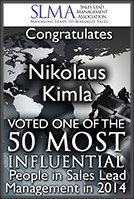Biography
Entrepreneur from the Beginning
Nikolaus Kimla was born in Vienna, Austria on April 9, 1961. Following a family tragedy he was raised by his mother on a very limited income—and it was at this early time in his life the entrepreneurial spirit of which he writes so passionately came into being for him. Like any other young teen, Nikolaus wanted money to be able to hang out with his friends, buy fashionable clothes, dine out, go to movies and so on. At age 16 he started his very first business, selling t-shirts, sweaters and other items, and by the time he turned 18 he had started his own photography studio. Every bit the entrepreneur, he has never looked back: over the last 40 years he has created six businesses, three of which are still going strong today.
Nikolaus was always out to expand his horizons. In 1984, when Nikolaus was just 23 a pivotal event occurred which heavily influenced his life direction (and of course that of many others): the release of the very first Apple Macintosh personal computer. At its release it was very expensive—just under US$2,500—but Nikolaus absolutely had to have one, and so managed to get the funds together to buy one.
Another of Nikolaus’ enterprises was that of being a writer, and at the time was using his new Macintosh to create articles and newsletters for clients. He was using the Aldus Pagemaker program, and he had the realization that while hardware was obviously vital to computing, it was actually software that was the most important aspect of automation; it gave direction and meaning to the use of the hardware. A short time later Nikolaus was actually hired by Apple Computer Dr. Schindler to create training programs for universities, and became the leader for the education program, it was during that time he realized he really needed to be in the software industry.
Software Developer
Nikolaus Kimla ended up opening one of the very first Apple dealerships in Austria, called uptime ITechnology, and it was then he entered the software industry. He divided uptime into two divisions: one for hardware sales and service, and the other for software development. He learned from the bottom up how to develop software, and the company has been a resounding success. One platform they developed on contract was called World-Check, a risk intelligence platform for the banking industry. World Check was eventually sold to Thomson Reuters for $520 million, and uptime ITechnology is still the developer for the application; in fact, they do twice the programming for World-Check than they did at the time of the sale.
After uptime had attained success, Nikolaus decided that his company should also develop software for which his company would retain the rights. He happened to attend a sales seminar put on by IBM that was one of the first to present the idea of the sales pipeline. At the conclusion of the seminar, Nikolaus approached the presenter and said that he’d be very interested in the concept of a sales software. The presenter actually didn’t have software; he just used a methodology to map out a sales pipeline. The penny dropped for Nikolaus Kimla, and he set out to develop what today is Pipeliner CRM.
[youtube:http://www.youtube.com/watch?v=yU-MboJ49Hs 500]
Sales Journey
Of course sales have been part and parcel of every business Nikolaus has founded—and in the beginning he did all the selling himself. In those days you couldn’t obtain a sales education at a college or university, and his initial training, as was the case with many sales professionals, was all “on the job.” He has since availed himself of every book on selling he could get his hands on, and every sales seminar he could attend. And of course he has continued wearing the hats of salesman and sales manager to this very day, for every enterprise in which he has been engaged.
As he moved along through the business world, he observed how undervalued salespeople actually were versus how much they contributed to a company’s survival and success. It always disturbed him, but it wasn’t until he discovered the Austrian School of Economics in 2003 that his mission to empower salespeople—as the entrepreneurs they actually are—fully unfolded.
It is no surprise that Nikolaus hadn’t come across the Austrian School while in Austria; while it was founded there, it has never gained traction in its native country. In the US, however, it has gained enormous popularity, and Nikolaus was to be transformed by its founders and their writings.
Central to Austrian School thinking is the free market economy, and pivotal to that economic model is the entrepreneur. The entrepreneur is not only capable of seeing opportunities that others miss, but is innovative in taking advantage of them and exploiting them to the profit of themselves, their companies and their local and national economies.
Being both an entrepreneur and a sales veteran himself, Nikolaus quickly grasped the concept that salespeople actually are entrepreneurs within the enterprise. They, too, are able to see and innovatively seize opportunities others never would; they seek to create their own incomes and wouldn’t have it any other way; they are capable of weighing risk versus reward, and instinctively knowing when to actively pursue an opportunity. Nikolaus set out to not only change the way the world thinks of salespeople, but to actually empower salespeople as the entrepreneurs they actually are.
Pipeliner CRM
Three of Nikolaus’s primary life journeys—as an entrepreneur, a software developer and as a salesperson and sales manager—finally coalesced into the development of his current product: Pipeliner CRM. The thrust of Pipeliner CRM is the sales pipeline: that precise series of steps that a sale travels through from lead to close, also known as the sales process. When a CRM solution is mapped according to a company’s sales process, salespeople can easily monitor and control their sales. They can visually see where each sale stands, how it rates against other opportunities, how the overall pipeline is progressing, and much more.
This approach also makes life much easier for sales management in monitoring, mentoring and controlling the sales force they are charged with. Not only can a sales manager clearly see the sales pipeline for one rep, but for a territory or even the entire sales force.
Nikolaus Kimla – Evangelist and Author
Due to his extensive study of economics, his evolution of his sales philosophy, and his considerable experience as a software developer, Nikolaus has much to share. Early on he knew he couldn’t do so simply through software products; hence he has been a prolific author. He has published three books in both German and English, on the subjects of salespeople, the IT revolution, and on Austrian Economic principles and their application. He continues to write and publish ebooks on many different aspects of selling—from lead generation to advanced opportunity management.
Education
While much of Nikolaus’s education has come “on the ground” from operating his many enterprises, he does also have a formal education behind him. He obtained a Master of Theology from the University of Vienna. He also studied Leadership and Growth at the Fuller Seminary in Pasadena, California and Leadership and Management Training at Psy Dynamics in Austria.
Learn more about my background or meet my family.








